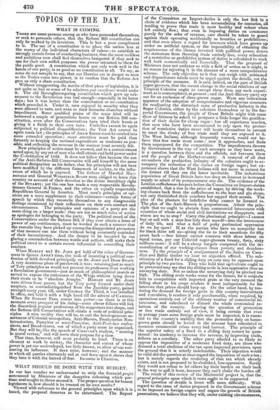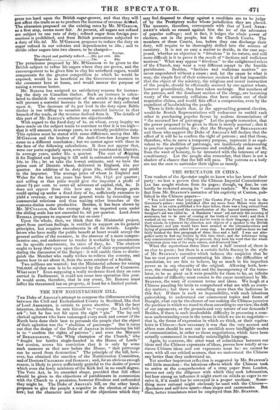WHAT SHOULD BE DONE WITH THE BUDGET.
Is our last number we endeavoured to strip the financial prriet announced by Ministers of the deceptive colouring which par- tisan seal sought to throw around it. The proper question for honest legislators is, how should it be treated on its own merits ?
Viewed with reference to the general principles upon which it is based, the proposal deserves to be entertained. The Report
of the Committee on Import-duties is only the last fink in a chain of evidence which has been accumulating for centuries, all tending to prove that trade is most healthy and robust when left entirely free ; that even in imposing duties on commerce
purely for the sake of revenue, care should be taken to guard against their operating accidentally as bounties or prohibitions;
and that even where a regard for interests which have grown up under an artificial system, or the impossibility of obtaining the acquiescence of the classes invested with political power, deters the statesman from throwing trade entirely free, every relaxation of a restrictive or prohibitive system of duties is calculated to work well both economically and financially. That the proposal of Ministers does not embrace so wide a field of action as it might, is no reason for rejecting it in the absence of a more comprehensive scheme. The only objection to it that can weigh with unbiassed and dispassionate minds must be urged against the details, not the principle of the measure. It is said, indeed, on the part of British sugar-growers, that the recent change in the social relations of our Tropical Colonies ought to exempt them from any such experi- ment as is contemplated, at present ; and the Anti• Slavery party cry out for an exclusion of slave-grown sugar. Were any indications apparent of the adoption of comprehensive and vigorous measures for readjusting the disturbed state of productive industry in the Sugar Colonies, either by the colonists themselves or by the Im- perial Government, the people of Great Britain might with some show of fairness be asked to postpone a little longer the gratifica- tion of their desire for cheap sugar : but all experience teaches, that men who have been accustomed to rely upon the protec- tion of restrictive duties never will bestir themselves in earnest to meet the rivalry of free trade until they are exposed to it. The West Indians, although frequently warned, would not be- lieve that free trade must come : now it approaches, and finds them unprepared for the competition. The impedirdents thrown by Government in the way of such attempts as they have made, is a question between them and the officials, not between them and the people of the Mother-country. A removal of all that encumbers the productive industry of the colonists ought to ac- company the reduction of the duties on foreign sugar ; but ex- perience shows that the West Indians will not move in earnest for the former till they see the latter inevitable. The industrious population of Great Britain have too deep an interest in increased supply to admit of its postponement sine die. The evidence of the London coffeehouse-keepers before the Committee on Import-duties established, that a rise in the price of sugar, by driving the work- ing-classes back from the coffeehouses to the beer and gin shops, not only diminished their comforts but sapped their morals. The plea of the planters for indefinite delay cannot be listened to. The plea of the Anti-Slavers is preposterous. Admit the prin- ciple that we ought to abstain from commercial intercourse with countries of whose social and civil institutions we disapprove, and where are we to stop ? Carry this pharisaical principle—I cannot buy or sell with a man less holy than myself—into the intercourse of daily life, and what a field of petty puritanical oppression do we lay open f If, as the parties who have no sympathy but for black skins tell us—giving the lie to their assertions for fifty years back—free labour cannot compete with slave labour oe equal terms, pay our Colonial sugar-growers twenty, forty, sixty millions more : it will be a cheap bargain compared with the de- moralization of our working-classes from poverty and drunken- ness. To the principle of a readjustment of the duties on Cana- dian and Baltic timber we hear no objection offered. The sub- stitution of a fixed for a sliding duty on corn may be opposed upon principle by two parties. They who hold that agriculture ought to be protected may say that the sliding scale is less oppressive than an unvarying duty. Not so unless the unvarying duty be pitched too high. The sliding scale works worst for the farmer, for it subjects him to competition with imported grain at the very moment the falling short in his crops renders it most indispensable for his interests that prices should keep up. On the other hand, by ren- dering the demand for foreign grain in this country intermittent and convulsive, it renders it only purchaseable, when required, by operations entirely out of the ordinary routine of commercial in- tercourse, and calculated to disturb the whole economical re- lations of the country. Leaving the question of protection or free trade entirely out of view, it being certain that even in average years some foreign grain must be imported, it is essen- tial to the country's stability that the protective duty on home- grown grain should be levied in the manner least calculated to occasion commercial crises every bad harvest. The principle of the superior safety of a fixed to a sliding duty cannot be ques- tioned : its tendency to increase the revenue, by improving trade, follows as a corollary. The other party alluded to as likely to oppose the imposition of a moderate fixed duty, are those who demand a total abolition of the tax upon imported provisions, upon the ground that it is utterly indefensible. Their objection would be valid did the question at issue regard the imposition of such a tax ; but it merely regards the rendering of that tax which already exists, and is not proposed to be abolished, less oppressive. Surely they would not refuse to let others lay their burden on their back in the way to gall it least, because they can't shake the burden oft The result of this review of the Ministerial project is, that the , general principles upon which it rests ought to be supported The question of details is beset with more difficulty. With regard to the rates of duties proposed in the Government scheme to be imposed on foreign sugars and sugars the growth of British possessions, we believe that they will, under existing circumstances, press too hard upon the British sugar-grower, and that they will not affect the trade so as to produce the increase of revenue desired. The alteration proposed on the existing rates by Mr. M`Gazoort, as a first step, seems more fair. At present, all sugars not refined are subject to one rate of duty; refined sugar from foreign pos- sessions is prohibited, and from British possessions subjected to a duty of 16s. 8d. Mr. M`Gazooa proposes to reduce the duty on sugar refined in our colonies and dependencies to 50s. ; and to divide other sugars into two classes, to be charged—
British. Foreign. The clayed and partially refined 20s. per cwt. 50s. Muscovado 15s. „ 24s.
The permission proposed by Mr. M‘Gamooa to be given to the British subject to refine his sugars where they are grown, and the encouragement to be given him to clay his unrefined sugars, would compensate for the greater competition to which he would be exposed, would be as beneficial as the Government measure to the consumer here at home, and would answer the purpose of raising a revenue better.
Mr. BARING has assigned no satisfactory reasons for increas- ing the duty on Canadian timber. Such an increase is calcu- lated to diminish the consumption of the article to a degree that will prevent a material increase in the amount of duty collected upon it. The decrease of 5s. per load in the duty upon Baltic timber is too trifling to occasion any material increase in that branch of the trade, or the revenue derived from it. The details of this part of Mr. BARING'S scheme are objectionable. With regard to the fixed duty of 8s. on wheat, every inquiry we have made on the subject tends to convince us that it is too high—
that it will amount, in average years, to a virtually prohibitive duty.
This opinion must be stated with some diffidence, seeing that Mr. M'GREGOR and the leaders of the Anti-Corn-law League have
come to a different conclusion ; but we cannot agree with them in the face of the following calculations. It does not appear that, were our ports regularly open, corn could be purchased at Dantzic,
in average years, under 35s. a quarter. The cost of ttliipping
it for England and keeping it till sold is estimated variously from 10s. to 18s.; let us take the lowest estimate, and we have the
prime cost of Dantzic wheat, delivered in England, 45s. per quarter. An addition of 8s. duty gives 53s., without any profit to the importer. The average price of wheat in England and Wales for the last ten years has been 56s. 114d. per quarter; and selling at that price would give the importer a profit of
about 7f per cent. to cover all advances of capital, risk, &c. It does not appear from this how any trade in foreign grain could spring up under a fixed duty of 88., sufficiently extensive to yield a revenue, or improve our general trade by extending our commercial relations and thus making other branches of the
customs-duties more productive. Besides, it has been shown by Mr. M'CuLLocri, that the average duty on imported corn under the sliding scale has not exceeded 6s. 8d. per quarter. Lord Jour( RusseLL proposes to augment the tax on corn !
Upon the whole, then, we think that the Ministerial project, apart from partisan feelings, is entitled to support on its general principles, but requires amendments in all its details. Legisla- lators who have really the public benefit at heart would accept the general outline of the measure, in the absence of a more compre- hensive one, and endeavour to render it workable by amendments on its specific enactments, its rates of duty, &c. The electors ought to keep their eyes upon the conduct of their representatives during the discussion of the Budget : it will enable them to distin- guish the Member who really wishes to relieve the country, and knows how to set about it, from the mere retainer of a faction. Two millions are wanted; but the Ministerial scheme for raising 700,0001. of that sum is to be rejected by the House of Commons.
What next ? Even supposing a really moderate fixed duty on corn carried in Parliament, it could not come into operation this year. It would seem, therefore, that in any event, Mr. BARING must inflict his threatened tax on property, at least for a limited period.



























 Previous page
Previous page